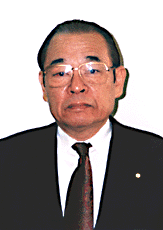Wataru Kubo
Wataru Kubo | |
|---|---|
久保 亘 | |
 | |
| Minister of Finance | |
| In office 5 January 1996 – 7 November 1996 | |
| Prime Minister | Ryutaro Hashimoto |
| Preceded by | Masayoshi Takemura |
| Succeeded by | Hiroshi Mitsuzuka |
| Deputy Prime Minister of Japan | |
| In office 5 January 1996 – 7 November 1996 | |
| Prime Minister | Ryutaro Hashimoto |
| Preceded by | Ryutaro Hashimoto |
| Succeeded by | Naoto Kan (2009) |
| Personal details | |
| Born | 15 January 1929 Kagoshima Prefecture, Empire of Japan |
| Died | 24 June 2003 (aged 74) Kagoshima, Kagoshima Prefecture, Japan |
| Political party | Social Democratic Party (1963–1997) Democratic Party of Japan (1997–2001) |
| Alma mater | Hiroshima University of Literature and Science |
Wataru Kubo (久保 亘, Kubo Wataru, 15 January 1929 – 24 June 2003) was a Japanese politician from the Social Democratic Party (SPD) and then from Democratic Party of Japan. He served as deputy prime minister and finance minister of Japan from 5 January 1996 to 7 November 1996.
Early life and education
[edit]Kubo was born in Kagoshima Prefecture on 15 January 1929.[1] He finished Kagoshima Normal School (currently Kagoshima University) and entered Department of Western History, Hiroshima University of Literature and Science (currently Hiroshima University).[2] He received a bachelor's degree from Hiroshima University of Literature and Science in 1952.[1]
Career
[edit]
Kubo started his career as a high-school teacher.[3] Then he involved in politics, and in 1963, he was elected to the Kagoshima Prefectural Assembly where he served for three terms.[1] He was first elected to the upper house in July 1974 from Kagoshima at-large district.[4][5] Until 1993 he served as chairman and a member of different committees at the house, including the budget and finance committee in the upper house.[1][6] In September 1993, he was named as secretary general of the Social Democratic Party during the term of the party chief Tomiichi Murayama.[5][7] He was also chief finance policy strategist[8] and deputy chairman of the party.[9][10]
He served as vice prime minister and finance minister from 5 January to 7 November 1996 in the first cabinet of Prime Minister Ryutaro Hashimoto that was a coalition of the Liberal Democratic Party, the SDP and New Party Sakigake.[5][11] Kubo's term ended when Hashimoto inaugurated his second cabinet and the coalition parties SPD and New Party Sakigake remained outside the government.[12] Kubo was succeeded by Hiroshi Mitsuzuka as finance minister.[12]
Kubo left the SPD on 6 January 1997 due to the disagreements with the SPD chief Takako Doi.[13][14] After his resignation, Kubo joined the Democratic Party of Japan (DPJ).[10] Then he became a member of the upper house with the DPJ.[4] He retired from politics as a member of the DPJ in June 2001 after serving four terms at the upper house, being a representative of Kagoshima Prefecture.[5][7]
Personal life
[edit]Kubo had a high rank in kendo.[6] He received the Grand Cordon of the Order of the Rising Sun, Japan's top award for contributions to the state and society, in November 2001.[15]
Death
[edit]Kubo died at a hospital in Kagoshima on 24 June 2003.[7] He was 74.[15]
References
[edit]- ^ a b c d "Lyon Summit Information". Japan Ministry of Foreign Affairs. Retrieved 5 January 2013.
- ^ "久保亘さんが語る:政治家が議会を去るとき 久保亘さんを語る:お別れのことば",Japan:三州倶楽部,2003,pp9-13
- ^ Richard Lloyd Parry (12 January 1996). "Socialist Teacher to Run Japan's Finances". The Independent. Tokyo. Archived from the original on 20 February 2014.
- ^ a b "Kubo says DPJ still no alternative for current coalition". Kyodo News. 26 June 2001. Retrieved 6 January 2013.
- ^ a b c d "Ex-Japan Socialist Party's Kubo Dies". Asia Africa Intelligence Wire. Tokyo. Jiji Press. 26 June 2003. Retrieved 9 September 2013.
- ^ a b Wudunn, Sheryl (12 January 1996). "Japan Names A Socialist as Finance Chief". The New York Times. p. 2.
- ^ a b c "Obituary: Wataru Kubo". The Japan Times. 27 June 2003. Retrieved 5 January 2013.
- ^ "International Business". Los Angeles Times. 11 January 1996. Retrieved 5 January 2013.
- ^ Sterngold, James (11 July 1993). "Japan's socialists moving to center". The New York Times. p. 9.
- ^ a b "Veteran politician Kubo to quit politics". Kyodo News. Kagoshima. 28 December 2001. Retrieved 6 January 2013.
- ^ "January 1996". Rulers. Retrieved 5 January 2013.
- ^ a b "New cabinet inaugurated". Trends in Japan. 8 November 1996. Retrieved 5 January 2013.
- ^ "Kubo leads more key defectors from SDP". The Japan Times. 6 January 1997. Retrieved 6 January 2013.
- ^ "Asia Week". CNN. 17 January 1997. Retrieved 24 January 2014.
- ^ a b "Kubo, former vice premier, dies at 74". Kyodo News. Tokyo. 26 June 2003. Retrieved 5 January 2013.
External links
[edit]- 20th-century Japanese politicians
- 1929 births
- 2003 deaths
- Deputy prime ministers of Japan
- Government ministers of Japan
- Ministers of finance of Japan
- Members of the House of Councillors (Japan)
- Democratic Party of Japan politicians
- Japan Socialist Party politicians
- Social Democratic Party (Japan) politicians
- Politicians from Kagoshima Prefecture
- Recipients of the Order of the Rising Sun
- Hiroshima University alumni
- Kagoshima University alumni
- People from Kagoshima Prefecture
